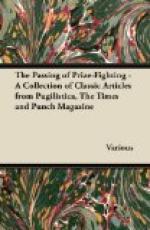* * *
A burglar broke into a barrister’s chambers in the Temple last week. We understand that he got away without having any money taken off him.
* * *
A woman who said she had had six husbands asked a London magistrate to grant her a separation. It is supposed that she is breaking up her collection.
* * *
Owing to the thick fog experienced in London, last week several daylight hold-ups were unavoidably postponed.
* * *
With the present fashion in ladies’ wear many owners of beautiful brooches are in the unhappy position of having nothing to attach them to.
* * *
In order to raise funds for the building of a new church-porch in a Birmingham parish a member of the committee suggested the sale of small flags in the street. Struck by the originality of this novel idea the chairman agreed to go into the matter in order to see if it was practicable.
* * *
A farmer writing from Bridgnorth, Salop, to a daily paper states that he has a tame fox which guards the house at night and shepherds the sheep by day. We understand that the Dogs’ Trade Union takes a serious view of the whole matter, but is not without hope of being able to avert a strike.
* * *
The real value of co-operation was illustrated the other day on the Underground Railway when a lady complained that a straphanger was standing on her foot. Word was immediately passed down the carriage, with the result that by a combined swaying movement in one direction the offender was enabled to remove his foot.
* * *
It is estimated that three hundred and forty thousand persons made fortunes out of the War. Of these it is only fair to say that the number who actually encouraged the War to happen are few. The vast majority simply allowed it to come along and do its worst.
* * *
The Corporation of London made L18 on the sale of waste paper in the year 1919-1920, as compared with over L9000 in the year 1918-1919. It looks as if in the last-named year the Corporation was in communication with a Government Department.
* * *
“Why will not Scotsmen eat eels?” asks The Manchester Guardian. We cannot say, but we have always understood that the attitude is reciprocal.
* * * * *
[Illustration: “Have you any—er—hats?”]
* * * * *
The Post-war hero.
It was a stainless patriot, who could
not bear to fight
For England the oppressor, or own that
she was right;
But when the War was over, to show his
martial breed,
He shot down three policemen and made
a woman bleed.
* * * * *
Paisley to the Rescue of the coalition.




